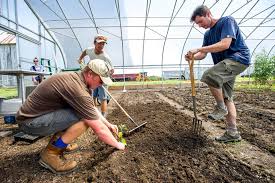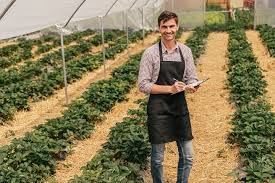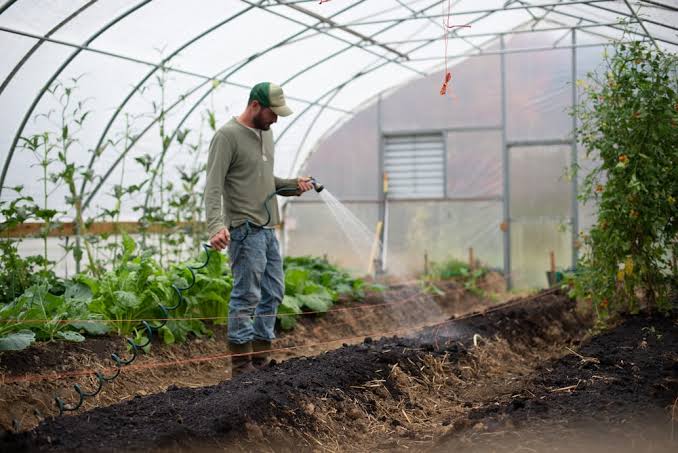Starting a small farm means embarking on a journey where you cultivate the land and nurture plants and animals. It involves turning a piece of earth into a place where life flourishes. As you step into the world of farming, you become a steward of the soil, responsible for its well-being.
To begin a small farm, one must first choose a suitable piece of land. This land becomes your canvas, where the green strokes of crops and the bustling activity of livestock will soon unfold. The soil’s richness is like a treasure waiting to be discovered, and understanding its composition is key to a successful harvest.
Planting seeds marks the beginning of a hopeful journey. As the tiny seeds nestle into the soil, you become a caretaker of their growth. Patience becomes your companion as you wait for the first sprouts to break through, heralding the promise of future abundance. Watering the plants becomes a daily ritual, a gentle reminder of the interdependence between farmer and field.
Animals join the farm family, each with its own unique role. Cows graze peacefully, chickens cluck and scratch, and pigs root around in the mud. The farm becomes a tapestry of diverse life, and each creature contributes to the ecosystem, creating a harmonious balance.
Seasons become your companions, dictating the rhythm of farm life. Spring brings the burst of new life, summer bathes the fields in warmth, autumn transforms the landscape into a tapestry of colors, and winter invites a period of rest and reflection. Adapting to the cycles of nature becomes second nature as a farmer.
Hard work becomes a daily companion on the farm. From dawn till dusk, you toil under the open sky, tending to the needs of the land and its inhabitants. Yet, amidst the sweat and dirt, a deep sense of satisfaction blooms as you witness the fruits of your labor.
Starting a small farm is not just about producing food; it’s about connecting with the earth and fostering a sustainable way of life. It’s about being attuned to the natural world, where every raindrop and ray of sunshine plays a role in the intricate dance of growth.
In the tapestry of a small farm, there are challenges woven into the fabric. Weather can be unpredictable, pests can test your patience, and market fluctuations may sway your plans. Yet, resilience becomes your ally as you navigate these challenges with a steadfast determination to nurture your farm.
As you till the soil, tend to crops, and care for animals, you realize that starting a small farm is not just a venture; it’s a lifestyle. It’s about sowing seeds of sustainability, reaping the rewards of hard work, and embracing the cycle of life that unfolds on the fertile canvas of your land. Starting a small farm is not just a journey; it’s a commitment to a way of life that honors the earth and its bountiful offerings.
Read Also: Rabbits Killing and Processing Procedures
How to Start a Small Farm

Starting a small farm can be a rewarding venture, allowing you to connect with the land and produce your own food. Here’s a simple guide to help you begin your journey into small-scale farming:
1. Define Your Goals: Before you put on your farming boots, take a moment to clarify your objectives. Ask yourself what you want to achieve with your small farm. Are you interested in growing vegetables, raising animals, or both? Defining your goals will guide your decisions and actions.
2. Select the Right Location: Choosing the right location is crucial. Look for a piece of land with good soil quality, access to water, and sufficient sunlight. Consider the climate of the area and the types of crops or animals that thrive there. Ensure that zoning regulations allow for agricultural activities.
3. Start Small: Don’t bite off more than you can chew. Begin with a small plot of land or a few animals. Starting small allows you to learn the ropes without overwhelming yourself. You can always expand as you gain experience and confidence.
4. Educate Yourself: Farming involves a range of skills, from planting and harvesting crops to caring for animals. Take advantage of online resources, local workshops, and agricultural extension services to enhance your knowledge. Learn about sustainable farming practices for long-term success.
5. Create a Business Plan: Treat your small farm as a business. Outline your budget, projected income, and expenses. Consider the costs of seeds, equipment, and any necessary permits. Having a well-thought-out business plan will help you stay organized and financially sound.
6. Choose the Right Crops and Livestock: Select crops and livestock that align with your goals and the local climate. Consider the demand for specific products in your area. It’s advisable to start with crops and animals that are well-suited to your region and require manageable care.
7. Invest in Essential Equipment: Depending on your chosen activities, invest in basic farming equipment. This may include hand tools, a tractor, irrigation systems, or animal shelters. Acquiring essential equipment gradually can ease the financial burden.
8. Build a Support Network: Connect with other local farmers, join community agricultural groups, and attend farmers’ markets. Building a network provides valuable insights, support, and potential collaborations. Learning from experienced farmers can be immensely beneficial.
9. Implement Sustainable Practices: Consider adopting sustainable farming practices to protect the environment and enhance the long-term viability of your farm. Practices like crop rotation, composting, and integrated pest management contribute to a healthier ecosystem.
10. Market Your Products: Develop a marketing strategy to sell your products. This could involve setting up a roadside stand, selling at farmers’ markets, or establishing partnerships with local grocery stores or restaurants. Create a brand that reflects the values of your small farm.
Starting a small farm may seem daunting, but with careful planning and a willingness to learn, you can embark on a fulfilling and sustainable agricultural journey. Remember, patience and persistence are key as you cultivate your small piece of the earth.
Read Also: Preventive Measures for Common Rabbit Diseases
Benefits of Starting a Small Farm

Starting a small farm comes with various benefits that extend beyond the joy of working the land. Here are some key advantages:
1. Self-Sufficiency: Operating a small farm allows you to produce your own food, promoting self-sufficiency. You have control over what you grow and raise, contributing to a more sustainable and independent lifestyle.
2. Healthier Lifestyle: Growing your own food means access to fresh, organic produce. This can lead to a healthier lifestyle, as you consume nutrient-rich fruits, vegetables, and meats without the potential harmful effects of pesticides or additives.
3. Connection to Nature: Small-scale farming provides a unique opportunity to connect with nature. Working the land, observing the seasons, and interacting with animals fosters a deep appreciation for the environment.
4. Community Engagement: Many small farmers engage with their local communities through farmers’ markets, community-supported agriculture (CSA) programs, or educational initiatives. This fosters a sense of community and supports local economies.
5. Learning and Skill Development: Operating a small farm involves a continuous learning process. From planting and harvesting to animal husbandry, you gain a diverse set of skills. This intellectual stimulation can be personally fulfilling.
6. Environmental Stewardship: Small-scale farmers often prioritize sustainable and eco-friendly practices. This commitment to environmental stewardship can have a positive impact on local ecosystems, promoting biodiversity and soil health.
7. Financial Independence: While not without its challenges, a successful small farm can provide a source of income. Diversifying your products and finding niche markets can contribute to financial independence.
8. Quality of Life: The pace and lifestyle associated with small-scale farming can enhance overall quality of life. It often involves a closer connection to the natural rhythms of the day, promoting a more balanced and fulfilling existence.
9. Preservation of Agricultural Heritage: Small farms play a role in preserving agricultural traditions and heritage. They contribute to maintaining a diverse and resilient agricultural landscape, which is essential for the overall health of the food system.
10. Flexibility and Autonomy: Small farmers enjoy a level of flexibility and autonomy in decision-making that larger-scale operations may lack. This allows for creative problem-solving and adaptability to changing circumstances.
In summary, starting a small farm goes beyond the tangible benefits of food production; it encompasses a holistic and enriching way of life that resonates with a growing number of individuals seeking a closer connection to their food and the land.
Read Also: Understanding Snap Finance: Empowering Consumer Purchases

